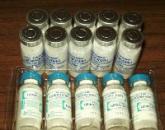Tussin instruction, reviews, price, description. Tussin: instructions for use.
Tussin - medicine with expectorant effect.
Active substance
Guaifenesin.
Release form
Tussin is produced in the form of syrup. The drug is sold in plastic bottles (118 ml syrup), placed in cardboard packs of 1 pc. The kit comes with a dosing cup.
Composition
Excipients: caramel, corn syrup, citric acid, menthol, sodium saccharin, cherry flavoring, glycerol, sodium benzoate, charming red dye, propylene glycol, purified water.
Indications
Tussin’s indication is a cough with difficult sputum against the background inflammatory processes in the upper respiratory tract:
- In acute bronchitis, pharyngitis, laryngitis, tracheitis.
- With acute viral infections (ARVI).
- With the flu.
Contraindications
Contraindications to the use of medications are:
- Gastric bleeding in the patient's history.
- Age of children under 2 years.
- Peptic ulcer of the duodenum and stomach in the acute phase.
- Increased individual sensitivity to guaifenesin and components of the drug.
Tussin is prescribed with extreme caution during pregnancy and lactation, as well as children under the age of 12 years.
Dosing and Administration
Optimum single dose of Tussin:
- Adult patients and children from the age of 12 years - 2-4 tsp. (200-400 mg) with a frequency of 3-4 times a day.
- Children aged 2 to 6 years - 1/2 -1 h. L. (50-100 mg) with a break of 6-8 hours.
- Children aged 6 to 12 years - 1-2 hours l. (100-200 mg) with a frequency of 3-4 times a day.
Side effects
The use of Tussin can provoke such side reactions as:
- central nervous system: constant drowsiness, dizziness, headache.
- Digestive system: diarrhea, abdominal pain, nausea, vomiting.
- Allergic manifestations: rash on the skin, urticaria.
Especially high doses of the drug can cause nausea and vomiting. In the event of vomiting, it is necessary to replenish body fluids and monitor electrolyte levels.
special instructions
While taking the drug may be staining the patient's urine in pink.
Gvayfenezin and its metabolites cause a change in the color of urine when it detects vanillylindic acid and falsely overestimate the results of the test with this substance on the content in the urine of catecholamines. In this regard, the reception Tussin required to stop 48 hours before collecting urine for this test.
Terms and conditions of storage
Store between 15 ° and 30 ° C. Keep out of the reach of children. Do not store in the refrigerator. Shelf life - 3 years.
Attention!
The description of the preparation on this page is a simplified version of the official version of the summary of the preparation. Information is provided for informational purposes only and is not a guide for self-medication. Before using the drug, you should consult with a specialist and read the instructions approved by the manufacturer.
4.5 4.50 out of 5 (4 votes)
Tussin represents drugwhich is widely used in the treatment catarrhal diseasesEspecially effective in eliminating cough.
Medicine has expectorant effect, helps to reduce the viscosity of sputum, facilitates its removal, as a result of the use of the drug unproductive cough turns into a productive, which greatly facilitates the patient's condition.
Indications
The drug is prescribed for cough with difficult sputum, as well as for inflammatory diseases of the upper respiratory tract (cold, acute viral infections, flu, acute bronchitis, tracheitis, pharyngitis, laryngitis).
Forms of release, composition
 available exclusively in the form of syrup 118 mg, there are two main forms of release: "Tussin" and "Tussin Plus". The kit includes a dosing cup with graduations 1 TSP corresponds to 1 tsp. = 5 ml.
available exclusively in the form of syrup 118 mg, there are two main forms of release: "Tussin" and "Tussin Plus". The kit includes a dosing cup with graduations 1 TSP corresponds to 1 tsp. = 5 ml.
Tussin Composition : guaifenesin, dextromethorphan, auxiliary components (sodium benzoate, citric acid, glucose, corn syrup, caramel, glycerin). Guaifenesin provides an expectorant effect by increasing the synthesis of bronchial mucus, contributes to the activation of the ciliary epithelium, depolymerization of acid mucopolysaccharides.
Dextromethorphan raises the cough threshold, suppresses afferent impulses of the mucous membrane of the respiratory tract, reduces the intensity of cough.
Dextromethorphan is the D-isomer of levorphanol, the effect on the substance resembles codeine, from which it is distinguished by the presence of analgesic properties, as well as the absence of negative effects on the respiratory center, the activity of the ciliary epithelium remains at the same level.
The duration of antitussive effect is 5-6 hours.
Instruction
Toussin is recommended to take 4-6 times a day after meals, a single dosage for children aged 6-12 years is 1-2 tsp. 3-4 times a day. Adults and children over 12 years old - 2-4 tsp. 3-4 times a day. Tussin Plus is recommended to be taken after meals with a measuring cup and a teaspoon.
Dosage for children aged 6-12 years is 1 tsp every 4 hours, adults and children over 12 should take 2 tsp. drug with the same interval.
Drug interaction
Tussin is well combined with bronchodilators, cardiac glycosides, antimicrobial agents. Tussin is not recommended for use simultaneously with mucolytic and antitussive (containing codeine) means.
A drug incompatible with drugs inhibiting MAO (including selegilin, procarbazine, furazolidone), which can provoke tremor, cramps, nausea, drowsiness, intracranial bleeding, hyperpyrexia, increased blood pressure, agitation, dizziness, coma, collapse, adrenergic crisis.
Tobacco smoke can cause increased secretion of the glands against the background of inhibition of the cough reflex.
Side effects
Reception Tussin may be accompanied by the following side effects:

Contraindications
It is necessary to refuse reception of Tussin in the following situations:
- severe organic diseases central nervous system;
- peptic ulcer diseases;
- moist cough with increased sputum;
- individual intolerance of individual components.
Tussin is not recommended for use at the age of two years, Tussin Plus is contraindicated for children up to six years. Caution should be observed when children at the age of 2-12 have persistent or chronic cough on the background of bronchial asthma or in combination with high secretion.
During pregnancy
Caution should be exercised during pregnancy and lactation.
 Tussin is recommended to be stored at a temperature not higher than thirty degrees, to protect from light and children, not to be stored in the refrigerator.
Tussin is recommended to be stored at a temperature not higher than thirty degrees, to protect from light and children, not to be stored in the refrigerator.
Price
average cost in Russia is 150-180 rubles., in Ukraine - 8-12 hryvnia.
Analogs of the drug
Tussin has a large number of analogues of pharmacological group, among which Fervex, Terpinkod, Terkodin, terrace D Tedein, Rengalin, Parakodamol, Padeviks Neo kodion, Kofanol, kodterpin, Kodelmikst, Codelac phyto, Codelac Broncho, Codelac Grippostad, Hood Knight, Glikodin , Bronhotsyn, Bronhoton, Bronholitin, Bronkholin sage, Bronhitusen, Vramed, Alex Plus.
Structural analogues include Synetos and Coldrex broncho.
Overdose
Overdose is accompanied by nausea, vomiting, drowsiness, painful sensations in the epigastric region. If these signs appear, it is necessary to flush the stomach, to carry out symptomatic therapy.
special instructions
During drug treatment, care should be taken when performing work related to the need to concentrate, requiring an increased rate of mental and motor responses. Alcohol is also recommended to be abandoned during this period..
To increase the effectiveness, Tussin therapy is recommended to be combined with postural drainage and vibrating breast massage. If after a week of treatment cough persists and there are prolonged headaches, sore throat, hyperthermia, skin rash - you should consult a doctor.
For treatment persistent cough Tussin is not recommended without a doctor's prescription.
Expectorant drug
Release form, composition and packaging
◊ Syrup in the form of a thick liquid of dark red color with a cherry smell.
Excipients: corn syrup, caramel, sodium saccharin, citric acid, cherry flavoring, menthol, sodium benzoate, glycerol, propylene glycol, charming red dye, purified water.
118 ml - plastic bottles (1) complete with a dosing cup - packs cardboard.
pharmachologic effect
Mucolytic and expectorant, reduces the viscosity of sputum, facilitates its removal and contributes to the transition of unproductive cough into productive. The duration of action with a single dose - 3.5-4 hours.
Pharmacokinetics
Absorption from the gastrointestinal tract is fast (25-30 minutes after ingestion). T 1/2 - 1 h. Penetrates into tissues containing acid mucopolysaccharides. Metabolism - in the liver. Excreted by the lungs (sputum) and kidneys in the form of inactive metabolites.
Indications
Cough with difficult sputum discharge inflammatory diseases upper respiratory tract:
- With acute viral infections;
- In acute laryngitis, pharyngitis, tracheitis, bronchitis.
Contraindications
- gastric ulcer and duodenal ulcer in the acute stage;
- a history of gastric bleeding;
- children's age up to 2 years;
- increased individual sensitivity to the components of the drug.
Carefully - pregnancy, lactation, child age up to 12 years.
Dosage
Use no more than 4-6 single doses during the day. The drug must be used after a meal.
Single dose: children from 2 to 6 years - 1/2 -1 tsp (50-100 mg) with an interval of 6-8 hours Children from 6 to 12 years - 1-2 teaspoons (100-200 mg) 3-4 times / day. Children from 12 years and adults - 2-4 teaspoons (200-400 mg) 3-4 times / day.
Side effects
From the side digestive system: nausea, vomiting, abdominal pain, diarrhea.
From the nervous system: dizziness, headache, drowsiness.
Tussin plus
Tussin Plus is a combination drug that has antitussive and expectorant effects and has two components in its composition - guaifenesin and dextromethorphan hydrobromide, which determine its pharmacological action.
Gvaynefezin is a drug with a pronounced expectorant effect, which is caused by an increase in secretion of the liquid component of sputum, and depolymerization of acid mucopolysaccharides leads to an increase in the activity of the atrial bronchial system epithelium and stimulation of the bronchial ciliary apparatus. As a result, the coughing up of viscous bronchial secretion is facilitated and the nature of the cough changes, transforming a painful dry cough into a moist and productive one.
Dextromethorphan in strength therapeutic action it is close to codeine and has the ability to suppress intense impulses of afferent origin from the mucous membranes of the respiratory tract and, as a result, increases the cough threshold without inhibiting the respiratory center and reducing the activity of the ciliary epithelium. it medicinal substance, being an isomer of levorphanol, has a pronounced local antitussive effect, reducing the intensity of dry cough. In connection with these effects, the drug Tussin plus is prescribed as an antitussive and expectorant for inflammatory and infectious diseases bronchopulmonary system, which are accompanied by a dry, painful cough.
The release form of the drug Tussin Plus is a red-orange syrup with the smell of cherry in bottles of 118 milliliters. He is appointed to adults, adolescents and children over six years of age after meals, and is dosed using a measuring cup.
For children from six to twelve years old, Tussin plus is prescribed in five milliliters (one teaspoon each) every four hours. For adults and teenagers, this drug is dosed ten milliliters (two teaspoons) every four hours.
It is important to remember that it is necessary to strictly adhere to the indicated dosages and frequency of administration, due to the fact that this drug, with its frequent or uncontrolled use, can cause adverse reactions in the patient in the form of dyspepsia, diarrhea, headache, dizziness, drowsiness, increased excitability or allergic reactions. As well as exacerbation of gastrointestinal ulcers or cause symptoms of overdose: severe dizziness, agitation, tachycardia, decreased blood pressure, vomiting, muscle hypertonus, respiratory depression, ataxia, impaired consciousness.
Contraindications to taking the drug are severe diseases of the central nervous system, diseases of the pulmonary system with abundant sputum discharge, pregnancy, children under six years of age and individual intolerance to the components of the drug. With caution Tussin used in ulcerative-inflammatory processes of the gastrointestinal tract or gastric bleeding (in history).
Tussin instruction
Tussin is a drug that is used to treat diseases of the respiratory system, accompanied by coughing with viscous sputum in laryngotracheitis, bronchitis, pulmonary cystic fibrosis, bronchial asthma, bronchiectasis and pneumonia. Its mechanism of action is due to therapeutic effect Guaifenesin, which is an active active ingredient of the drug Tussin.
He is appointed to children older than two years, adolescents and adults, after eating, the frequency of admission is determined by the attending physician, but should not exceed four to six single doses during the day. A single dose of Tussin for adults and children over twelve years of age ranges from two to four teaspoons with a minimum interval of four hours.
In pediatric practice, children from two to six years old use Tussin in a single dose of ½ - 1 teaspoon, and over six years old - one - two teaspoons in four hours, no more than 4-6 times a day.
Tussin price
Tussin syrup is freely sold in the pharmacy chain of any city, and its average cost is 150 -155 rubles.
Tussin reviews
The drug Tussin is widely used in the practice of pediatricians and therapists for the treatment of irritating cough with viscous sputum. It is effective in tracheitis, bronchitis of various etiologies, alveolitis (in young children), pneumonia, cystic fibrosis and congenital pathology of the bronchopulmonary system.
Similar instructions:
Bromhexine - detailed instructions
Popular
- Breast cancer is curable at any stage.
- The remedy for the cold Sinupret
- Azitrox - official instructions for use
- Chicken-bjaka: allowed antibiotics were found in Russian chicken
- Oral Cancer: Symptoms and Treatment
- Dark and thick blood during menstruation.
- Modern analogues of doxycycline tablets
- Is it possible to die from pneumonia
- What earwax will tell all about your health
- Tussin: instructions for use



